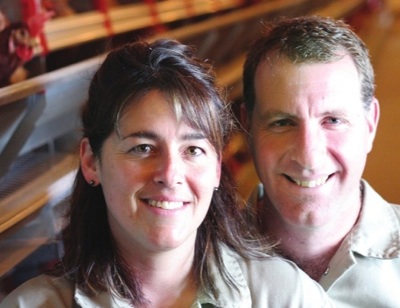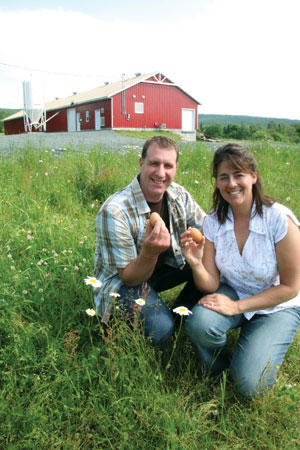
No Quota, No Problem
By By André Dumont
Features New Technology ProductionJoanne LaBranche and Patrick Côté have realized their dream
Joanne LaBranche and
Patrick Côté just couldn’t believe their eyes. The weekly agriculture
newspaper La Terre de chez nous was announcing a new program offering a
free lifetime quota loan for 5,000 layers.
Joanne LaBranche and Patrick Côté just couldn’t believe their eyes.
 |
|
| Joanne LaBranche and Patrick Côté took advantage of FPOCQ’s start-up program that allowed them to get into egg farming without buying quota. Advertisement
|
The weekly agriculture newspaper
La Terre de chez nous was announcing a new program offering a free lifetime quota loan for 5,000 layers.
“We looked at each other and said: ‘This is for us. We have to apply, ’ ” Joanne says.
That was in 2006. Twelve years earlier, Joanne and Patrick had abandoned the idea of going into egg production because of high start-up costs. They now decided to direct all their efforts into preparing for the contest put forward by the Fédération des producteurs d’œufs de consommation du Québec (FPOCQ – Quebec Egg Farmers).
It was a summer with very few outings for Justin, 10, Anthony, 12, and Philippe, 14, as their parents were often busy visiting poultry farms and crunching numbers in front of a computer screen.
The business plan was finished a few days before the deadline. After putting so much effort into their application, Joanne and Patrick were convinced they’d be among finalists. “Our application was clear and concise. Everything was there, exactly as requested,” Joanne says.
The good news came on Oct. 27, 2006. The couple became the first beneficiaries of the FPOCQ’s Start-up Assistance Program for new producers. They were to become egg producers, without having to invest in quota.
“We felt very, very privileged,” says Patrick, who was a poultry representative for the Coopérative fédérée de Québec before buying a hog farm with his wife in Kinnear’s Mills, near Thetford Mines, in 1994.
Joanne and Patrick decided to build an 8,640 layerhouse with new equipment only. The building currently houses 5,550 (some rented quota was added). Egg revenues complement those from their 5,000-hog-per-year swine operation.

|
| Joanne LaBranche and Patrick Côté spent months preparing their application to acquire quota. |
If their application stood out from the lot, they say, it’s because they have complementary experience. Joanne holds a degree in business administration and is also a Certified Management Accountant (CMA). She handled the financial side. Patrick used his experience and contacts in the poultry industry to gather up-to-date technical data. The couple also relied on its past experience bringing a hog operation to high performance levels.
Joanne and Patrick refuse to see themselves as the happy winners of a lottery jackpot, even though the egg quota they use is worth several hundred thousands of dollars. “People don’t see all the work we put into this,” Patrick says. “There were 32 other candidates and I’m sure they worked just as hard as we did.”
Even with the free quota, starting up was no joyride. Investing more than $400,000 at the same time the Quebec hog industry was entering a crisis was a nerve-wracking experience. From Day 1 of construction to the first egg pay, finances were stretched to the limit.

|
|
| “We felt very, very privileged,” says Patrick. |
This was no risk-free investment, Patrick says. If for any personal reason, the egg production must stop, the quota goes back to the FPOCQ. An empty 8,640-layer henhouse with no quota to sell along with it isn’t worth much, he says. However, the loaned quota is transferable to the next generation. Patrick and his wife hope at least one of their three sons will take over one day.
The FPOCQ’s start-up program was founded to address a concern for the accessibility of egg farming to newcomers. Even though many of the current 103 egg farmers in Quebec have children willing to take over, one hard fact remains: the availability and price of egg quota makes it nearly impossible to start a new production.
Producing eggs had long been excluded in Joanne and Patrick’s plans to diversify their farm. “For anyone with financial means similar to ours, it’s simply impossible to start,” Patrick says.
In 2006, FPOCQ members decided to use part of the federation’s quota reserve to help start up one new layer farm every year. The decision was not unanimous, because the program excludes existing farmers’ immediate family members, while others didn’t see the point in starting a new farm with so few hens.
“Quebec egg producers have always been visionaries,” says FPOCQ president Serge Lefebvre. “If we want to keep our number of producers stable, we have to make space for new ones.”
The program addresses both the problems of egg farm concentration in
specific regions and the slow but steady erosion of the number of egg
farmers throughout the province. In 2007, the free quota loan was
awarded to Nicholas Tremblay, who will build his henhouse in
Saguenay-Lac-Saint-Jean, a region where there are only four other egg
producers.
The FPOCQ is also in the process of setting up a centralized quota
exchange system. This will make quota more accessible to those who
received help to start and now want to expand, Lefebvre says.
For now, quota prices remain very high. But will that be the case in
the future, when new quota allocations to Quebec will allow the FPOCQ
to help more than one new producer get started every year?
The deadline for application in 2008 was June 30. The name of this year’s winner was announced in October.
|
Start-up programs in Quebec Eggs The Fédération des producteurs d’œufs de consommation du Québec (Quebec Egg Producers) offers one free lifetime quota loan for 5,000 layers every year. This quota is only transferable to one’s children. Regions with lower egg production density are advantaged. Chicken Milk The Fédération des producteurs de lait du Québec (FPLQ – Quebec Milk Farmers) offers a five-kilogram quota loan to young producers joining an existing farm. After five years, the quota must be reimbursed at a rate of one kilogram per year. The FPLQ also offers a limited number of 10-kilogram quota loans towards new milk farms.
How the Program Works
|
Print this page